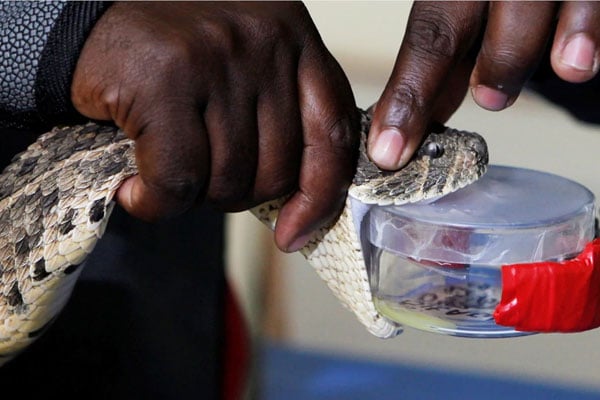Equip health facilities with venom antidotes

Burden: In Uganda, a number of people are bitten by snakes but many die due to lack of anti-venoms that match the type of snake. PHOTO/REUTERS.
What you need to know:
- The tragic demise of a student at Namasagali College and many others who die from snake bites should be an eye-opener to all of us.
Early last week, a Namasagali College student succumbed to a poisonous snake bite. Nasser Ssajjabi, a 17-year-old Senior Three student, had on the fateful night returned from preps when a venomous cobra bit his leg as he lay asleep in his bed.
Since he was deep asleep, Ssajjabi is said to have thought a mosquito had bitten him and did not take the bite seriously and continued to sleep. Hardly 30 minutes passed when he started feeling a lot of pain, and that is when he realised he had been bitten by a snake.
His right hand started getting paralysed, and the pain increased especially around the chest, coupled with general body weakness.
Panic set in and there was a need to rush Ssajjabi to the nearby Namasagali Health Centre III to neutralise the venom in his body. Just like many hospitals and health centres across the country, there were no venom antidotes that they could use to save the life of the dying Ssajjabi.
But being desperate to save the student’s life, they quickly rushed him to Kamuli General Hospital but still, venom antidotes were not in stock either, and it was at this time that he lost the battle to the snake bite.
Uganda has more than 80 species of snakes, with five percent of them being venomous. Some of the venomous snakes include the Egyptian Cobra, Black Mamba, Gabon Viper, and Black Forest Cobra.
Given the many snake species in the country, it is simple logic that this will translate into snake bites, hence the need to stock sufficient venom antidotes in our health centres.
Yes, the venom antidotes may be expensive since a dose goes for Shs300,000, or thereabout, but that is little money compared to the loss of a productive citizen.
Ssajjabi’s life was tragically cut short and who knows what he would have become in the future, probably a medical doctor, an engineer, a lawyer, a journalist, name it.
The excuse by those in charge of venom antidotes distribution that since they do not fall in the category of essential drugs such as antimalarials, coupled with the claim that they are expensive, should hold no water.
The tragic demise of Ssajjabi and many others who die in similar circumstances should be an eye-opener to all of us because we are susceptible to snake bites.
Let us save lives from avoidable deaths caused by snake bites by stocking venom antidotes.



